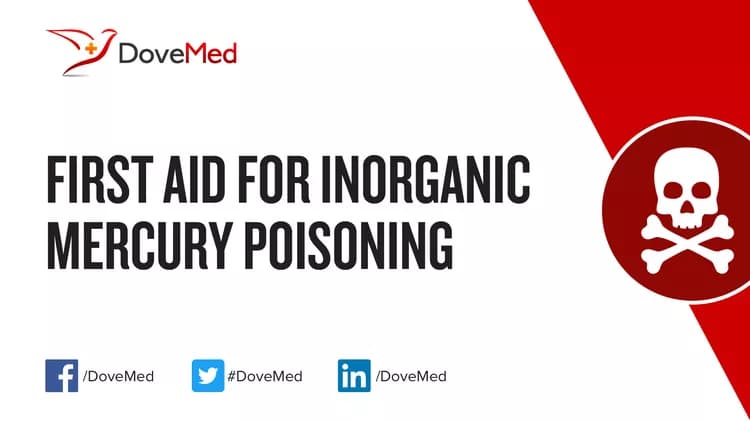What is Inorganic Mercury Poisoning?
- Mercury (Hg) is a heavy silver-grey liquid metal that exists in elemental, organic, and inorganic forms. The inorganic form of mercury may be used in certain antiseptics, skin-lightening creams, and native medicines
- Inorganic Mercury Poisoning is the accidental or intentional intake of compounds containing the chemical
- The condition is diagnosed based upon the clinical history, combination of signs and symptoms, and additional tests (that may include, in some cases, radiological studies and laboratory tests)
Inorganic Mercury Poisoning may be also referred to as Inorganic Mercury Toxicity.
What are the Causes of Inorganic Mercury Poisoning?
- Inorganic Mercury Poisoning is caused by the ingestion/swallowing of compounds containing inorganic mercury. Exposure may also occur following inhalation of vapors or dust particles
- This intake could be accidental, or in some cases intentional, to bring self-harm
- All forms of mercury are considered to be highly-toxic and exposure to mercury compounds are known to present severe symptoms and complications
- Inorganic mercury is also found in chemistry lab (as salts), inside batteries and certain topical skin ointments
Note: The compound can interact with other prescribed or non-prescribed medications in the body. Such interactions may enhance the therapeutic effects of other medications being taken, resulting in undesired side effects.
What are the Signs and Symptoms of Inorganic Mercury Poisoning?
The signs and symptoms of Inorganic Mercury Poisoning can vary from one individual to another. It may be mild in some and severe in others. Several systems of the body may be affected. The poisoning may occur due to swallowing or inhalation of the compound. Children are severely affected from mercury poisoning than adults.
The signs and symptoms of Inorganic Mercury Poisoning may include:
- Nausea and vomiting
- Diarrhea (blood in stool); severe poisoning may lead to severe diarrhea consequently resulting in massive blood and fluid loss from the body
- Cough, sore throat, and chest pain
- Abdominal pain
- Burning pain in the mouth, throat, food-pipe, and stomach
- Skin and eye exposure may result in dermatitis (inflammation of the skin) and itching of eyes respectively
- Breathing difficulties from inhaling inorganic mercury compound dust or vapors
- Swallowing difficulties
- When the toxic compound affects blood, it can result in malfunctioning of several internal organs and result in permanent renal injury
How is First Aid administered for Inorganic Mercury Poisoning?
First Aid tips for Inorganic Mercury Poisoning:
- Call 911 or your local emergency help number immediately, for emergency assistance
- Call the Poison Control Center at 1-800-222-1222 (or your local poison control center) for further instructions
- Provide them with information such as the compound taken, quantity and time of ingestion, age, weight and general health status of affected individual
- Carefully remove the individual from the exposure area; move them to region of fresh air immediately
- Confirm that the airways are protected; also, ensure breathing and the presence of pulse
- Unless instructed by a healthcare professional, DO NOT induce vomiting in the affected individual
- Take individual to emergency room (ER) for further treatment
- Always try to take the compound bottle/container to the ER
The emergency medical health professional might perform the following steps towards treating the condition:
- Monitoring of vital signs
- Medically manage symptoms and provide breathing support, if necessary
- Administer fluids by an intravenous drip line
- Undertake kidney dialysis, if necessary
- Additionally, in the case of Inorganic Mercury Poisoning, the following treatment is provided:
- Administer activated charcoal to avoid absorbance of the substance in the body
- Administer suitable medication (chelators) to counter the effects of the toxin
Who should administer First Aid for Inorganic Mercury Poisoning?
First aid for Inorganic Mercury Poisoning is administered by healthcare professionals.
- The individual who is affected, or someone near, should call 911 for emergency assistance (or the local emergency number)
- They should also call the poison control center at 1-800-222-1222 (or the local poison control center) and follow instructions
What is the Prognosis of Inorganic Mercury Poisoning?
- The prognosis of Inorganic Mercury Poisoning is dependent on the amount of substance consumed, time between consumption and treatment, severity of the symptoms, as well as general health status of the patient
- Severity of the poisoning and timely medical assistance are the key prognostic indicators. If early treatment is provided and suitable medication and support provided, the prognosis may be improved
- Severe poisoning from ingestion of large amounts of inorganic mercury compounds and salts may seriously affect internal organs and result in renal failure, massive internal hemorrhage, substantial loss of blood/fluids from the body, and permanent brain damage. In such cases, death is a high possibility
In general, toxicities are common situations in the emergency departments. A majority of the cases are often not fatal, when appropriate treatment is given.
How can Inorganic Mercury Poisoning be Prevented?
Inorganic Mercury Poisoning can be prevented by:
- Suitably disposing any material or equipment that contains mercury and its compounds/salts
- Keeping any poisonous/hazardous chemicals and other materials out of children’s reach
- Keep all poisons correctly labeled and in suitable storage locations
- Being aware of basic first aid steps in case of an emergency (such as inadvertent poisoning)
What are certain Crucial Steps to be followed?
- Call 911 (or your local emergency number) for emergency assistance, if symptoms are life-threatening
- Call Poison Control Center at 1-800-222-1222 (or the local poison control center) and follow the recommend steps
- It would be helpful if the following information is readily available:
- Type, amount and time of consumption of the substance
- Age and weight of the individual
- And, the overall health status of the individual
Related Articles
Test Your Knowledge
Asked by users
Related Centers
Related Specialties
Related Physicians
Related Procedures
Related Resources
Join DoveHubs
and connect with fellow professionals


0 Comments
Please log in to post a comment.